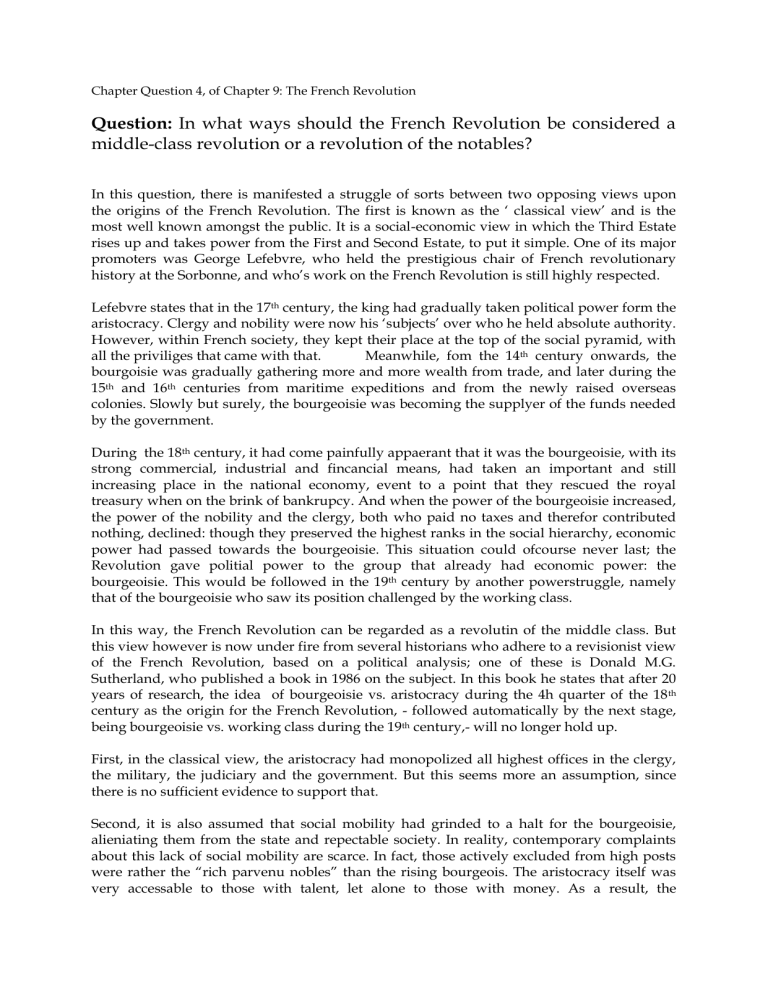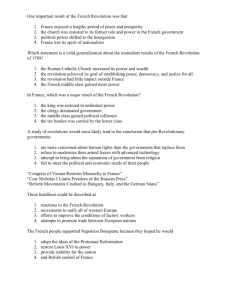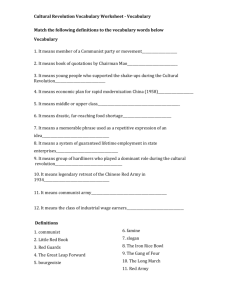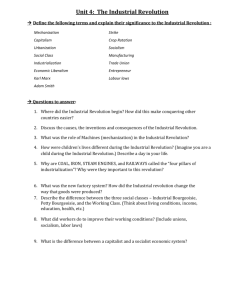Chapter Question 4, of Chapter 9: The French Revolution

Chapter Question 4, of Chapter 9: The French Revolution
Question: In what ways should the French Revolution be considered a middle-class revolution or a revolution of the notables?
In this question, there is manifested a struggle of sorts between two opposing views upon the origins of the French Revolution. The first is known as the ‘ classical view’ and is the most well known amongst the public. It is a social-economic view in which the Third Estate rises up and takes power from the First and Second Estate, to put it simple. One of its major promoters was George Lefebvre, who held the prestigious chair of French revolutionary history at the Sorbonne, and who’s work on the French Revolution is still highly respected.
Lefebvre states that in the 17 th century, the king had gradually taken political power form the aristocracy. Clergy and nobility were now his ‘subjects’ over who he held absolute authority.
However, within French society, they kept their place at the top of the social pyramid, with all the priviliges that came with that. Meanwhile, fom the 14 th century onwards, the bourgoisie was gradually gathering more and more wealth from trade, and later during the
15 th and 16 th centuries from maritime expeditions and from the newly raised overseas colonies. Slowly but surely, the bourgeoisie was becoming the supplyer of the funds needed by the government.
During the 18 th century, it had come painfully appaerant that it was the bourgeoisie, with its strong commercial, industrial and fincancial means, had taken an important and still increasing place in the national economy, event to a point that they rescued the royal treasury when on the brink of bankrupcy. And when the power of the bourgeoisie increased, the power of the nobility and the clergy, both who paid no taxes and therefor contributed nothing, declined: though they preserved the highest ranks in the social hierarchy, economic power had passed towards the bourgeoisie. This situation could ofcourse never last; the
Revolution gave politial power to the group that already had economic power: the bourgeoisie. This would be followed in the 19 th century by another powerstruggle, namely that of the bourgeoisie who saw its position challenged by the working class.
In this way, the French Revolution can be regarded as a revolutin of the middle class. But this view however is now under fire from several historians who adhere to a revisionist view of the French Revolution, based on a political analysis; one of these is Donald M.G.
Sutherland, who published a book in 1986 on the subject. In this book he states that after 20 years of research, the idea of bourgeoisie vs. aristocracy during the 4h quarter of the 18 th century as the origin for the French Revolution, - followed automatically by the next stage, being bourgeoisie vs. working class during the 19 th century,- will no longer hold up.
First, in the classical view, the aristocracy had monopolized all highest offices in the clergy, the military, the judiciary and the government. But this seems more an assumption, since there is no sufficient evidence to support that.
Second, it is also assumed that social mobility had grinded to a halt for the bourgeoisie, alieniating them from the state and repectable society. In reality, contemporary complaints about this lack of social mobility are scarce. In fact, those actively excluded from high posts were rather the “rich parvenu nobles” than the rising bourgeois. The aristocracy itself was very accessable to those with talent, let alone to those with money. As a result, the
aristocracy was relatively young, being in a constant state of renewal. In this way, the French
Revolution can also be regarded as a revolution of the notables.
In the end, as the revisionists state, both the nobility and the bourgeoisie could agree upon uniting and overthrowing the absolutist government and its king, and replace it with a liberal constitution. After that however, both groups turned against each other. The reason for that is still subject of debate.
Marc Geerdink-Schaftenaar, 10 juni 2009.







